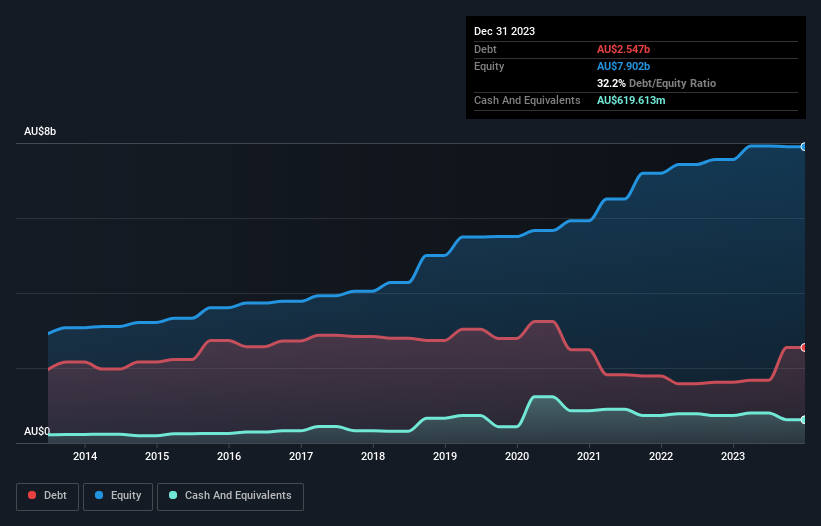- Australia
- /
- Healthcare Services
- /
- ASX:SHL
These 4 Measures Indicate That Sonic Healthcare (ASX:SHL) Is Using Debt Reasonably Well

Some say volatility, rather than debt, is the best way to think about risk as an investor, but Warren Buffett famously said that 'Volatility is far from synonymous with risk.' So it seems the smart money knows that debt - which is usually involved in bankruptcies - is a very important factor, when you assess how risky a company is. As with many other companies Sonic Healthcare Limited (ASX:SHL) makes use of debt. But is this debt a concern to shareholders?
Why Does Debt Bring Risk?
Debt assists a business until the business has trouble paying it off, either with new capital or with free cash flow. Part and parcel of capitalism is the process of 'creative destruction' where failed businesses are mercilessly liquidated by their bankers. While that is not too common, we often do see indebted companies permanently diluting shareholders because lenders force them to raise capital at a distressed price. Of course, the upside of debt is that it often represents cheap capital, especially when it replaces dilution in a company with the ability to reinvest at high rates of return. The first step when considering a company's debt levels is to consider its cash and debt together.
View our latest analysis for Sonic Healthcare
What Is Sonic Healthcare's Debt?
The image below, which you can click on for greater detail, shows that at December 2023 Sonic Healthcare had debt of AU$2.55b, up from AU$1.62b in one year. However, it also had AU$619.6m in cash, and so its net debt is AU$1.93b.

A Look At Sonic Healthcare's Liabilities
The latest balance sheet data shows that Sonic Healthcare had liabilities of AU$2.17b due within a year, and liabilities of AU$3.69b falling due after that. Offsetting this, it had AU$619.6m in cash and AU$1.07b in receivables that were due within 12 months. So it has liabilities totalling AU$4.17b more than its cash and near-term receivables, combined.
While this might seem like a lot, it is not so bad since Sonic Healthcare has a market capitalization of AU$13.0b, and so it could probably strengthen its balance sheet by raising capital if it needed to. But it's clear that we should definitely closely examine whether it can manage its debt without dilution.
We measure a company's debt load relative to its earnings power by looking at its net debt divided by its earnings before interest, tax, depreciation, and amortization (EBITDA) and by calculating how easily its earnings before interest and tax (EBIT) cover its interest expense (interest cover). Thus we consider debt relative to earnings both with and without depreciation and amortization expenses.
With a debt to EBITDA ratio of 1.7, Sonic Healthcare uses debt artfully but responsibly. And the alluring interest cover (EBIT of 7.3 times interest expense) certainly does not do anything to dispel this impression. Shareholders should be aware that Sonic Healthcare's EBIT was down 47% last year. If that decline continues then paying off debt will be harder than selling foie gras at a vegan convention. The balance sheet is clearly the area to focus on when you are analysing debt. But it is future earnings, more than anything, that will determine Sonic Healthcare's ability to maintain a healthy balance sheet going forward. So if you're focused on the future you can check out this free report showing analyst profit forecasts.
Finally, a company can only pay off debt with cold hard cash, not accounting profits. So we clearly need to look at whether that EBIT is leading to corresponding free cash flow. Over the last three years, Sonic Healthcare recorded free cash flow worth a fulsome 90% of its EBIT, which is stronger than we'd usually expect. That puts it in a very strong position to pay down debt.
Our View
Sonic Healthcare's EBIT growth rate was a real negative on this analysis, although the other factors we considered were considerably better. There's no doubt that its ability to to convert EBIT to free cash flow is pretty flash. It's also worth noting that Sonic Healthcare is in the Healthcare industry, which is often considered to be quite defensive. When we consider all the factors mentioned above, we do feel a bit cautious about Sonic Healthcare's use of debt. While debt does have its upside in higher potential returns, we think shareholders should definitely consider how debt levels might make the stock more risky. The balance sheet is clearly the area to focus on when you are analysing debt. But ultimately, every company can contain risks that exist outside of the balance sheet. For example - Sonic Healthcare has 3 warning signs we think you should be aware of.
If you're interested in investing in businesses that can grow profits without the burden of debt, then check out this free list of growing businesses that have net cash on the balance sheet.
New: Manage All Your Stock Portfolios in One Place
We've created the ultimate portfolio companion for stock investors, and it's free.
• Connect an unlimited number of Portfolios and see your total in one currency
• Be alerted to new Warning Signs or Risks via email or mobile
• Track the Fair Value of your stocks
Have feedback on this article? Concerned about the content? Get in touch with us directly. Alternatively, email editorial-team (at) simplywallst.com.
This article by Simply Wall St is general in nature. We provide commentary based on historical data and analyst forecasts only using an unbiased methodology and our articles are not intended to be financial advice. It does not constitute a recommendation to buy or sell any stock, and does not take account of your objectives, or your financial situation. We aim to bring you long-term focused analysis driven by fundamental data. Note that our analysis may not factor in the latest price-sensitive company announcements or qualitative material. Simply Wall St has no position in any stocks mentioned.
Have feedback on this article? Concerned about the content? Get in touch with us directly. Alternatively, email editorial-team@simplywallst.com
About ASX:SHL
Sonic Healthcare
Offers medical diagnostic and administrative services to medical practitioners, hospitals, community health services, and patients in Australia, the United States, Germany, and internationally.
Excellent balance sheet average dividend payer.


